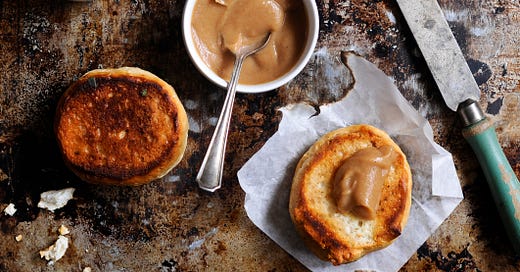Paid subscribers, your contribution lets me pay writers $1/word. Thank you! (If you haven’t yet supported Smart Mouth and its writers, please subscribe here).
Apple Butter to Soothe the Soul
By Andrea Squiccimara
Each autumn, people take to local apple orchards, purchasing an impractical amount of apples, finding themselves unable to meaningfully use them, and contributing to the alarming food waste crisis in the United States. What to do with a peck of apples that will never make it into a recipe, lunch box, or snack? Instead of shamefacedly scooping a brownsided apple into the compost bin, choose to engage with your inner American Girl Doll and stir your way into your own apple butter. With its simple, repetitive steps, making apple butter offers a meditative exercise rooted in history, community, and resourcefulness.
The earliest mentions of apple butter come from Central and Western Europe during the middle ages as a preservation technique for an orchard’s surplus. As European migration to North America increased, the colonists’ food preservation methods spread throughout the territory and took root in places like Pennsylvania, Ohio, and North Carolina.
Apple butter scholarship, consisting mostly of community cookbooks and recipes reprinted in newspapers and magazines, enumerates supplies — cauldrons, stirring implements — and calls-to-action for community participation in a daylong undertaking to ensure that apples never go to waste. The Chataquan, a 19th-century magazine devoted to culture, described the production of apple butter in an 1890 edition as a community sport that “like all other good things, demands patience for its achievement.”
The preparation of apple butter stems from necessity and in the World War II era, it was a patriotic duty. Publications framed it as a quaint return to America’s colonial roots in the effort to ration sugar and promote at-home gardens. The War Food Administration in 1945 reported a “larger than average” supply of apples and implored families to utilize a recipe for apple butter that included Karo corn syrup in the place of freshly pressed cider.
Sundry apple butter recipes exist for every time commitment level - including purchasing artisanal jarred varieties from far flung orchards with inviting names. Apple butter, at all times, is within reach. Rescue apples from ruin, pick a recipe and get to work. Inhale on this tradition that came long before you and exhale on the sweet reward of a job well done. Heal yourself, one stir at a time.
Puritans Didn’t Eat Mince Pies. But You Should
Mince pies are a traditional British Christmas sweet pastry that has never really caught on in America. While Americans came to embrace stockings hung by the fire for St Nicholas to fill with gifts, along with the ancient Druidic winter solstice symbols of fir trees, holly, and mistletoe, the controversial 17th-century status of mincemeat has dogged mince pies since then. The controversy began in England when, under the rule of Oliver Cromwell after the English Civil War, there was a general crackdown on religious celebrations in favor of fasting and abstinence. The Puritans disliked all of the drunken debauchery associated with Christmas: anti-Puritan pamphlets of the time satirically referenced attacks on mince pies when protesting the general ban on anything fun. At that time, mince pies were truly made of sweetened minced meat with the addition of spices and dried fruits, a practice that dated back to the Middle Ages, when sugar was found to preserve meat.
The Puritans made up a large enough chunk of the English colonizers in America to carry on the bad press on mince pies, long after the Restoration of Charles II to the English throne that brought back all the rowdy Christmas festivities. Mince pies eventually crept over Stateside, though they were demonized by the devoutly Protestant abolitionists in the late 1800s and early 1900s. They blamed mince pies for everything from indigestion to madness (mince pies were even occasionally used as the attempted defense for murders). Prohibition followed, and mince pie was still part of the debauchery conversation: there’s alcohol in the filling. Naturally, under Prohibition, the alcohol content of mince pies soared when culinary usage provided a legitimate way to consume alcohol. This made the Prohibitionists even angrier.
Over time, the recipe evolved away from the quite possibly overly-rich meat version. Today, mince pies are made with dried fruits like sultanas, raisins, currants, and even cranberries, soaked overnight in brandy — or orange juice for a non-alcoholic version — and mixed with fresh, chopped apple, candied fruit peel, and slivered almonds. In Britain, mince pies are fruity, sticky and fragrant, encapsulating Christmas in a buttery pastry case, spiced with cinnamon, cloves, and nutmeg. The fat in the filling traditionally comes from suet — the only remaining ingredient with a connection to meat — which gives the mincemeat its appealing glossy sheen. The same effect can be had with vegetarian suet, or butter as a more readily available alternative.
The mince pie really does not deserve the centuries of hate and subsequent obscurity it has endured in the USA. After all, Brits traditionally leave a mince pie – not a cookie – to thank Santa on Christmas Eve. If it’s good enough for Santa, it’s definitely good enough for the US. 🥧
More About Food:
Can someone recommend a brand of canned crab that isn’t nasty, or is that just the nature of the beast? (Though I did just find out about canned scallops - delicious!) Please tell me in the comments.
Is The Great British Bake-Off wildly political? The argument is compelling!

If you enjoy the newsletter today, please forward it to someone who’d enjoy it, and tap the heart icon above or below, which will help me reach more readers. I appreciate your help, y’all!
This newsletter is edited by Katherine Spiers, host of the podcast Smart Mouth.
A TableCakes Production.
Want to contribute? Here are the submission guidelines.






Loved reading about the attacks on mince pies - great story!
BTW these are the scallops https://www.marksindundee.com/product/ramon-pena-stewed-variegated-scallops-silver-line/